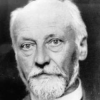Ludwig Quidde

Ludwig Quidde
Ludwig Quiddewas a German pacifist who is mainly remembered today for his acerbic criticism of German Emperor Wilhelm II and a politician. Quidde's long career spanned four different eras of German history: that of Bismarck; the Hohenzollern Empire under Wilhelm II; the Weimar Republic; and, finally, Nazi Germany. In 1927, he was awarded the Nobel Peace Prize...
NationalityGerman
ProfessionCritic
Date of Birth23 March 1858
CountryGermany
real war danger
Armaments are necessary - or are maintained on the pretext of necessity - because of a real or an imagined danger of war.
exception exists interfere method military
One can take exception to this idea on the grounds that a method of disarmament exists which does not interfere with military security.
incurable poor treated
As long as it was only we poor pacifists who said that kind of thing we were treated as lunatics, as incurable utopians, or even as traitors.
drawn members positions
In any consideration of disarmament, a distinction must be drawn between the positions of pacifists, of members of parliament, and of governments.
years special unions
The following year, after I had prepared my draft, the Conference of the Interparliamentary Union at The Hague decided to set up a special commission to study the problem seriously.
maintenance guarantees doe
Even a total and universal disarmament does not guarantee the maintenance of peace.
war moving causes
Lightly armed nations can move toward war just as easily as those which are armed to the teeth, and they will do so if the usual causes of war are not removed.
progress maintenance made
Disarmament or limitation of armaments, which depends on the progress made on security, also contributes to the maintenance of peace.
mean simple effort
Time and time again we have experienced efforts directed toward this popular and simple concept of securing peace by means of disarmament.
ideas may lasting-love
The popular, and one may say naive, idea is that peace can be secured by disarmament and that disarmament must therefore precede the attainment of absolute security and lasting peace.
intellectual economic burden
It will be sufficient to point to the enormous burdens which armaments place on the economic, social, and intellectual resources of a nation, as well as on its budget and taxes.
country taken levels
The present level of armaments could be taken as the starting point. It could be stipulated in an international treaty that these armaments should be simultaneously and uniformly reduced by a certain proportion in all countries.
umpires progress arbitration
Great progress was made when arbitration treaties were concluded in which the contracting powers pledge in advance to submit all conflicts to an arbitration court, treaties which not only specify the composition of the court, but also its procedure.
powerful psychology logic
In life, particularly in public life, psychology is more powerful than logic.